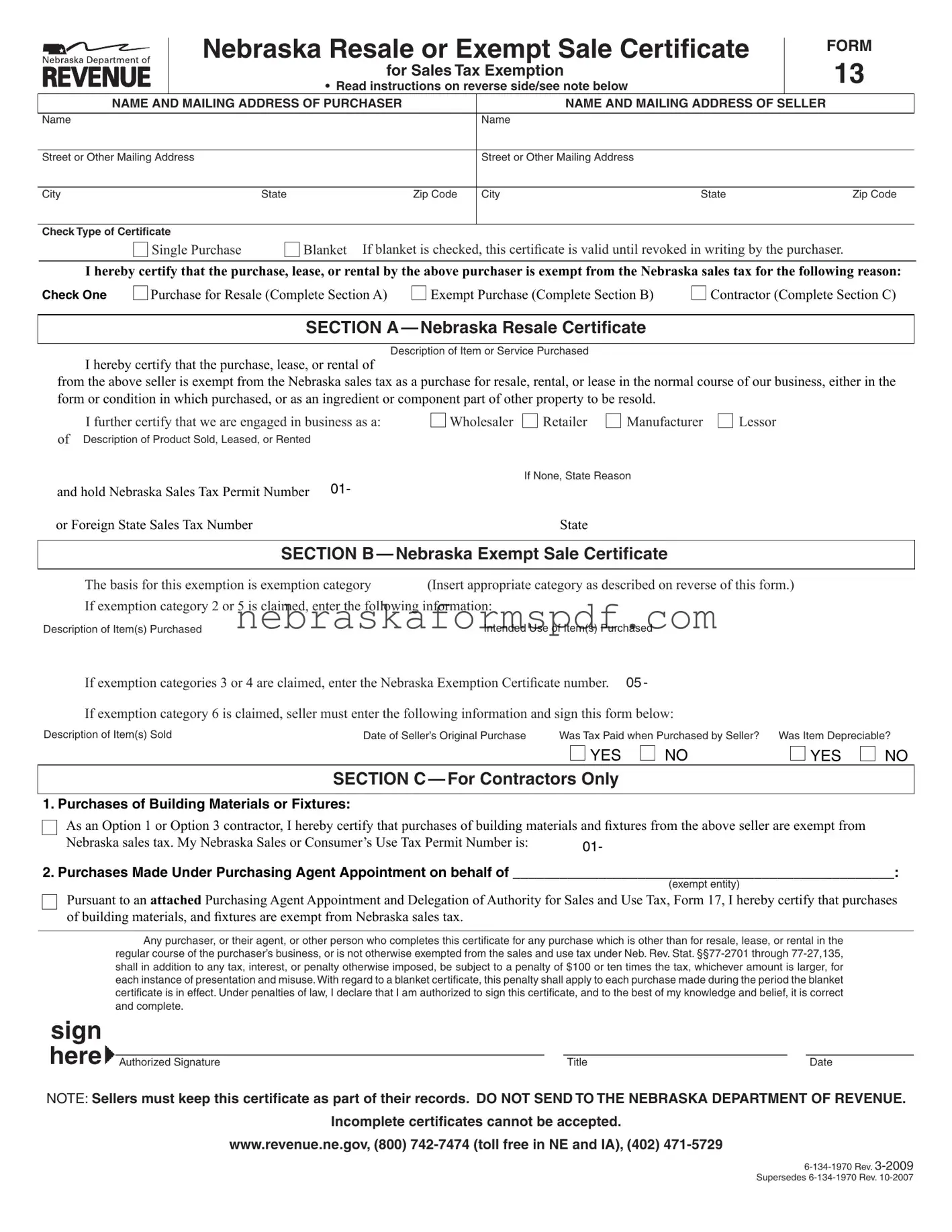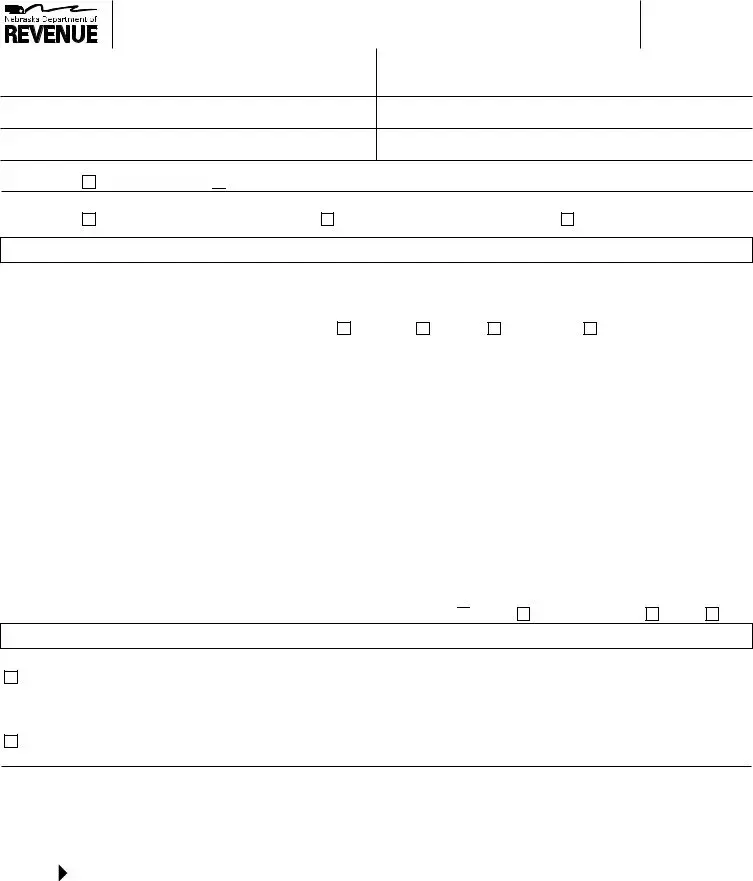|
Who maY ISSue a ReSaLe CeRtIfICate. Form 13, |
(3) a statement of basis for exemption including completion of all |
|
Section A, is to be issued by persons or organizations making |
information for the basis chosen, (4) the signature of an authorized |
|
purchases of property or taxable services in the normal course of |
person, and (5) the date the certiicate was issued. |
|
their business for the purpose of resale either in the form or condition |
penaLtIeS.Any purchaser who gives a Form 13 to a seller for |
|
in which it was purchased, or as an ingredient or component part of |
|
any purchase which is other than for resale, lease, or rental in the |
|
other property. |
|
normal course of the purchaser’s business, or is not otherwise |
|
Who maY ISSue an eXempt SaLe CeRtIfICate. |
exempted from sales and use tax under the Nebraska Revenue Act, |
|
Form 13, Section B can only be issued by persons or organizations |
shall be subject to a penalty of $100 or ten times the tax, whichever |
|
exempt from payment of the Nebraska sales tax by qualifying for |
amount is larger, for each instance of presentation and misuse. |
|
one of the six enumerated Categories of Exemption (see below). |
Any purchaser, or their agent, who fraudulently signs a Form 13 |
|
Nonprofit organizations that have a 501(c) designation and are |
may be found guilty of a Class IV misdemeanor. |
|
exempt from federal and state income tax are not automatically |
|
CATEGORIES OF EXEMPTION |
|
exempt from sales tax. Only the entities listed in the referenced |
|
|
1. Purchases made directly by certain governmental agencies |
|
regulations are exempt from paying Nebraska sales tax on their |
|
purchases when the exemption certiicate is properly completed and |
identiied in Nebraska Sales and Use Tax Reg-1-012, Exemptions; |
|
provided to the seller. Organizations claiming a sales tax exemption |
Reg-1-072, United States Government and Federal Corporations; |
|
may do so only on items purchased for their own use. For health care |
and Reg-1-093, Governmental Units, are exempt from sales tax. |
|
organizations, the exemption is limited to the speciic level of health |
A list of speciic governmental units are provided in the above |
|
care they are licensed for. The exemption is not issued to the entire |
regulations. Governmental units are not assigned exemption |
|
organization when multiple levels of health care or other activities are |
numbers. |
|
|
provided or owned by the organization. Items purchased by an exempt |
Sales to the United States government, its agencies, and |
|
organization that will be resold must be supported by a properly |
corporations wholly owned by the United States government are |
|
completed Nebraska Resale Certiicate, Form 13, Section A. |
exempt from sales tax. However, sales to institutions chartered |
|
Indicate the category which properly relects the basis for your |
or created under federal authority, but which are not directly |
|
exemption. Place the corresponding number in the space provided |
operated and controlled by the United States government for the |
|
in Section B. If category 2 through 6 is the basis for exemption, you |
beneit of the public, generally are taxable. Construction projects |
|
must complete the information requested in Section B. |
for federal agencies have speciic requirements, see Reg-1-017 |
|
Nebraska Sales and Use Tax Reg-1-013, Sale for Resale – Resale |
Contractors. |
|
Purchases that are not exempt from Nebraska sales and use tax |
|
Certificate, and Reg-1-014, Exempt Sale Certificate, provide |
|
include, but are not limited to, governmental units of other states, |
|
additional information on the proper issuance and use of this |
|
sanitary and improvement districts, urban renewal authorities, |
|
certificate. These and other regulations referred to in these |
|
rural water districts, railroad transportation safety districts, and |
|
instructions are available on our Web site: www.revenue.ne.gov/ |
|
county historical or agricultural societies. |
|
legal/regs/slstaxregs. |
|
2. Purchases when the intended use renders it exempt as set out |
|
Use Form 13E for purchases of energy sources which qualify for |
|
in paragraph 012.02D of Reg-1-012, Exemptions. Complete |
|
exemption. Use Form 13ME for purchases of mobility enhancing |
|
the description of the item purchased and the intended use as |
|
equipment on a motor vehicle. |
|
required on the front of Form 13. Sellers of repair parts for |
|
ContRaCtoRS.Form 13, Section C, Part 1, must be completed |
|
agricultural machinery and equipment cannot accept a Form 13 |
|
by contractors operating under Option 1 or Option 3 to document |
to exempt such sales from tax. |
|
their tax-free purchase of building materials or ixtures from their |
3. Purchases made by organizations that have been issued a |
|
suppliers. Section C, Part 2, may be completed to exempt the |
|
Nebraska |
Exempt Organization - Certiicate of Exemption are |
|
purchase of building materials or ixtures pursuant to a Purchasing |
|
exempt from sales tax. Reg-1-090, Nonproit Organizations; |
|
Agent Appointment, Form 17. See the contractor information guides |
|
Reg-1-091, Religious Organizations; and Reg-1-092, Educational |
|
on our Web site www.revenue.ne.gov for additional information. |
|
Institutions, identify such organizations. These organizations will |
|
|
|
WheReto fILe. Form 13 is given to the seller at the time of |
be issued a Nebraska state exemption identiication number. This |
|
the purchase of the property or service or when sales tax is due. |
exemption number must be entered in Section B of the Form 13. |
|
The certiicate must be retained with the seller’s records for audit |
4. Purchases of common or contract carrier vehicles and repair and |
|
purposes. Do not send to the Department of Revenue. |
replacement parts for such vehicles. |
|
SALES TAX NUMBER. A purchaser who completes Section A |
5. Purchases |
of manufacturing machinery or equipment by |
|
and is engaged in business as a wholesaler or manufacturer is |
a taxpayer engaged in business as a manufacturer for use |
|
not required to provide an identification number. Out-of-state |
predominantly in manufacturing. This includes the installation, |
|
purchasers can provide their home state sales tax number. Section B |
repair, or maintenance of such qualiied manufacturing machinery |
|
does not require an identification number when exemption |
or equipment (see Revenue Ruling 01-11-1). |
|
category 1, 2, or 5 is indicated. |
6. A sale that qualiies as an occasional sale, such as a sale of |
|
pRopeRLY CompLeteD CeRtIfICate. A purchaser |
|
depreciable machinery and equipment productively used by the |
|
must complete a certificate before issuing it to the seller. To |
seller for more than one year and the seller previously paid tax on |
|
properly complete the certificate, the purchaser must include: |
the item. The seller must sign and give the exemption certiicate |
|
(1) identiication of the purchaser and seller, (2) a statement whether |
to the purchaser. The certiicate must be retained by the purchaser |
|
the certiicate is for a single purchase or is a blanket certiicate, |
for audit purposes (see Reg-1-014, Exempt Sale Certiicate). |






 YES
YES